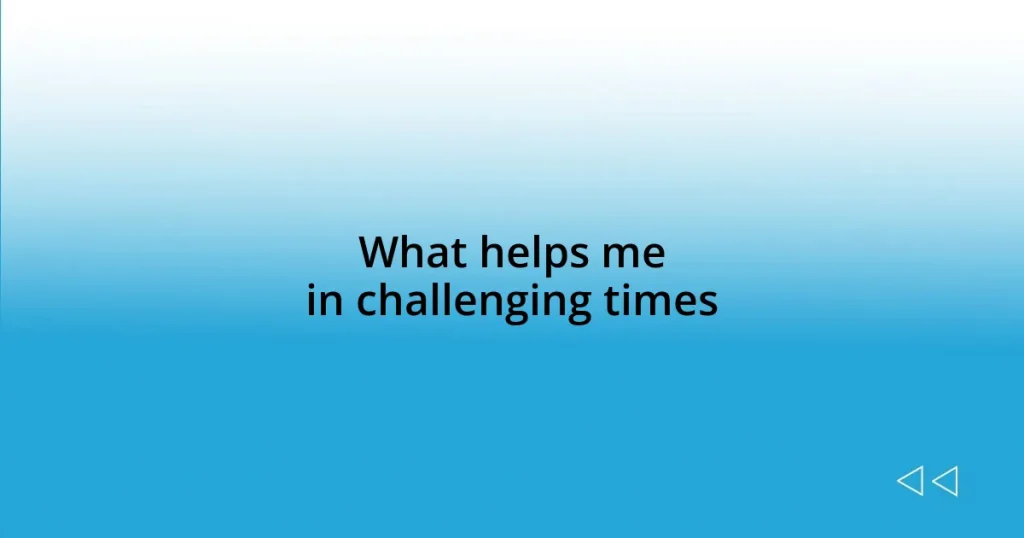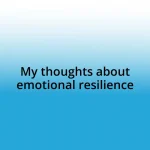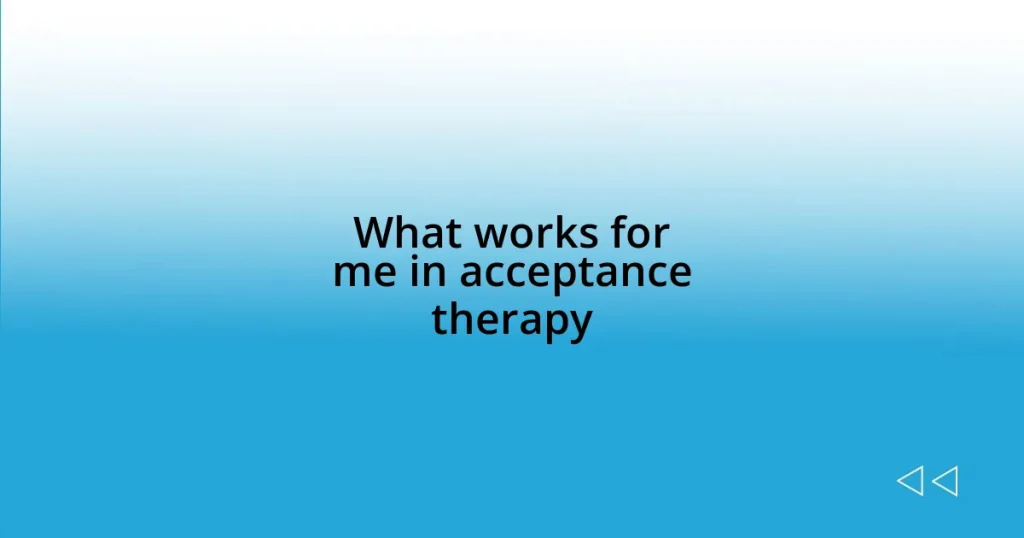Key takeaways:
- Challenging times reveal personal strengths and offer opportunities for growth through simple routines and coping strategies like journaling, mindfulness, and physical activity.
- Building a quality support network enhances resilience and fosters deeper connections, emphasizing the importance of surrounding oneself with encouraging individuals.
- Setting realistic, small goals in recovery helps maintain motivation and recognizes the significance of every step forward, while maintaining physical health and seeking professional help are crucial for overall well-being.
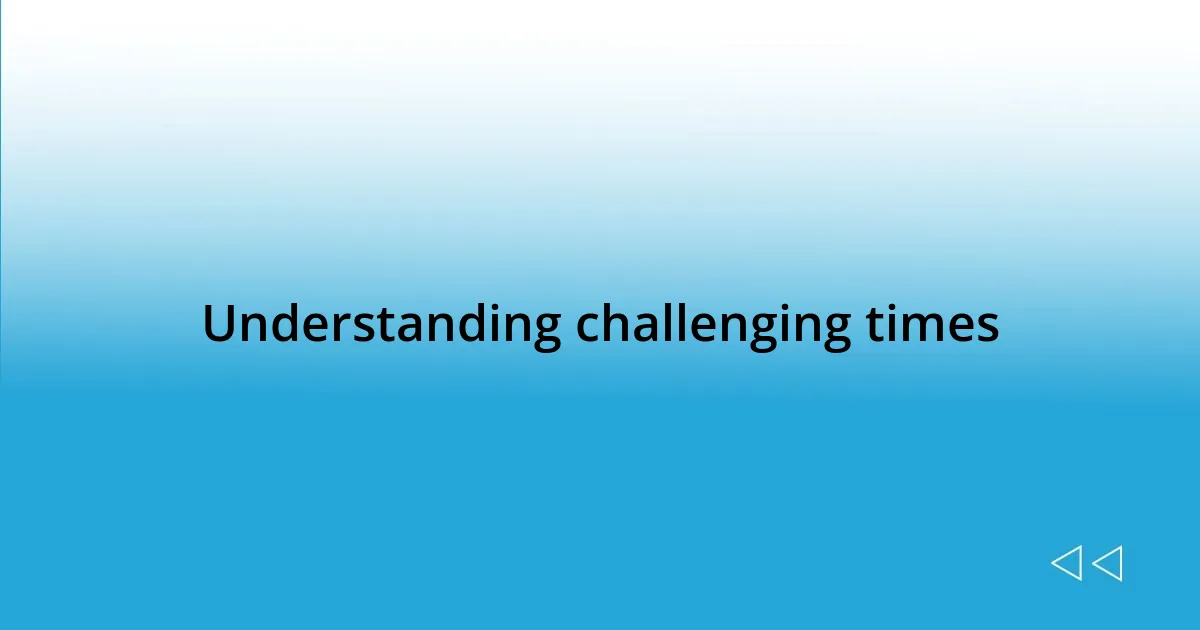
Understanding challenging times
Challenging times often bring the most unexpected lessons. I remember a period when I faced significant job uncertainty. It felt like standing on the edge of a cliff, with the ground crumbling beneath my feet. Have you ever experienced a moment when your stability was rocked so entirely that it forced you to reassess your priorities and values?
These moments test our resilience and often reveal strengths we didn’t know we possessed. During a particularly tough season, I found comfort in simple routines—like morning walks and journaling. I discovered that even small actions can create a sense of control and stability amidst chaos. Have you found solace in any daily habits during your own tough times?
It’s easy to feel isolated when facing challenges, but remember, these experiences connect us as humans. I often feel a wave of empathy when I hear others share their struggles. It’s a reminder that we’re not alone; our challenges can foster deeper connections. How has your journey through challenges shaped your understanding of community and support?
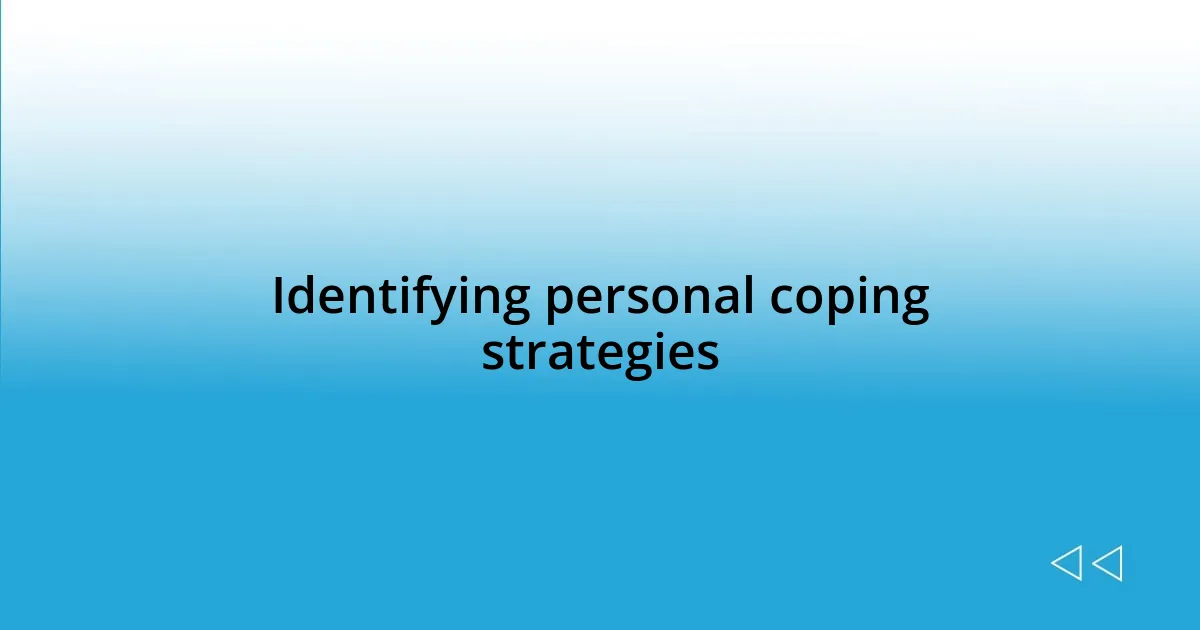
Identifying personal coping strategies
Identifying personal coping strategies is crucial during challenging times. I’ve often found that reflecting on previous experiences helps me uncover what truly resonates with me. For instance, when I felt overwhelmed by stress, I turned to creative outlets like painting. It was surprising how immersing myself in colors and shapes provided clarity and peace. Have you ever found your own rhythm in an unexpected hobby?
Here are some effective personal coping strategies that might resonate with you:
- Journaling: Writing down thoughts can help process emotions and offer insights.
- Mindfulness Meditation: Practicing mindfulness can ground you in the present moment, reducing anxiety.
- Physical Activity: Whether it’s a brisk walk or yoga, movement can release pent-up stress.
- Connecting with Nature: Spending time outside can rejuvenate your spirit and inspire new perspectives.
- Reaching Out: Sometimes a simple conversation with a friend or family member can ease burdens and foster support.
What strategies have you discovered that bring you comfort?
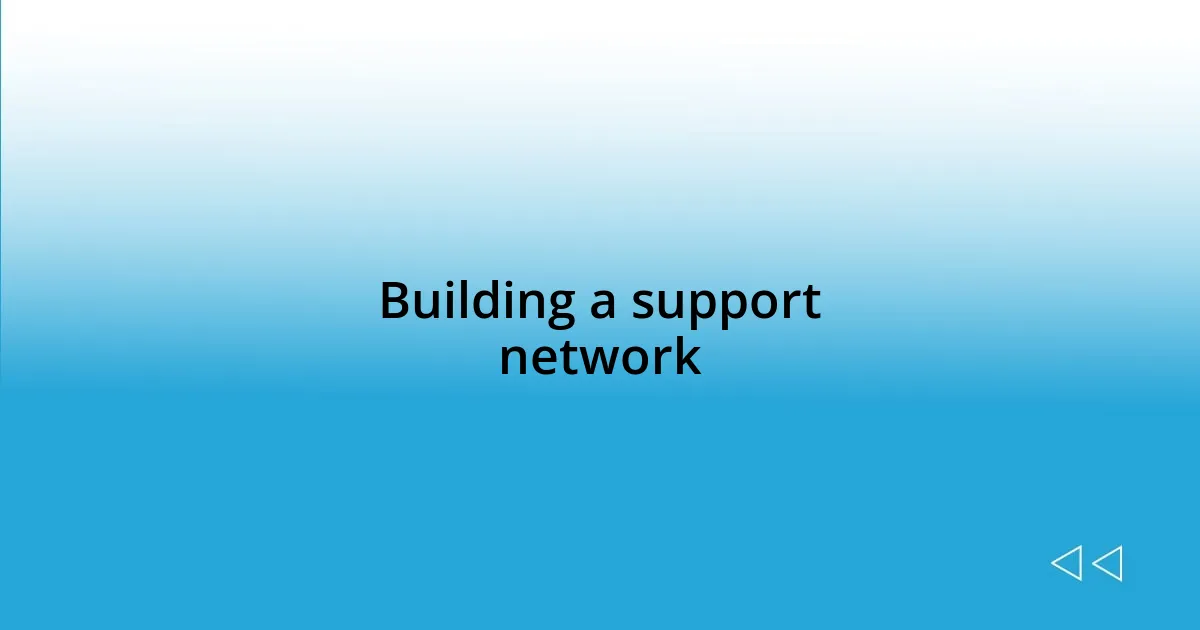
Building a support network
Building a support network is one of the most vital steps I’ve taken during challenging times. When I faced a particularly tough period, reaching out to friends and family provided me with a safety net. Just knowing I had someone to talk to felt like having a lifeline—a reminder that I wasn’t navigating my struggles alone. Have you ever felt that rush of relief when a trusted friend lends an ear?
When building my support network, I learned that it’s not just about quantity but also quality. I gravitated towards individuals who offered encouragement and understanding, rather than additional stress. This experience made it clear to me how essential it is to surround ourselves with those who lift us up. Who in your life inspires you to push through tough times?
Interestingly, the act of supporting others can strengthen these bonds even further. For example, I found that lending my support to a friend facing her own battles created a beautiful cyclical energy. It reminded me that, even while coping with my difficulties, I could contribute positively to someone else’s journey. How have your experiences with supporting and being supported shaped your connections with others?
| Aspect | My Experience |
|---|---|
| Support Source | Friends and Family |
| Quality of Support | Encouraging and Understanding |
| Mutual Support | Helping each other strengthens bonds |
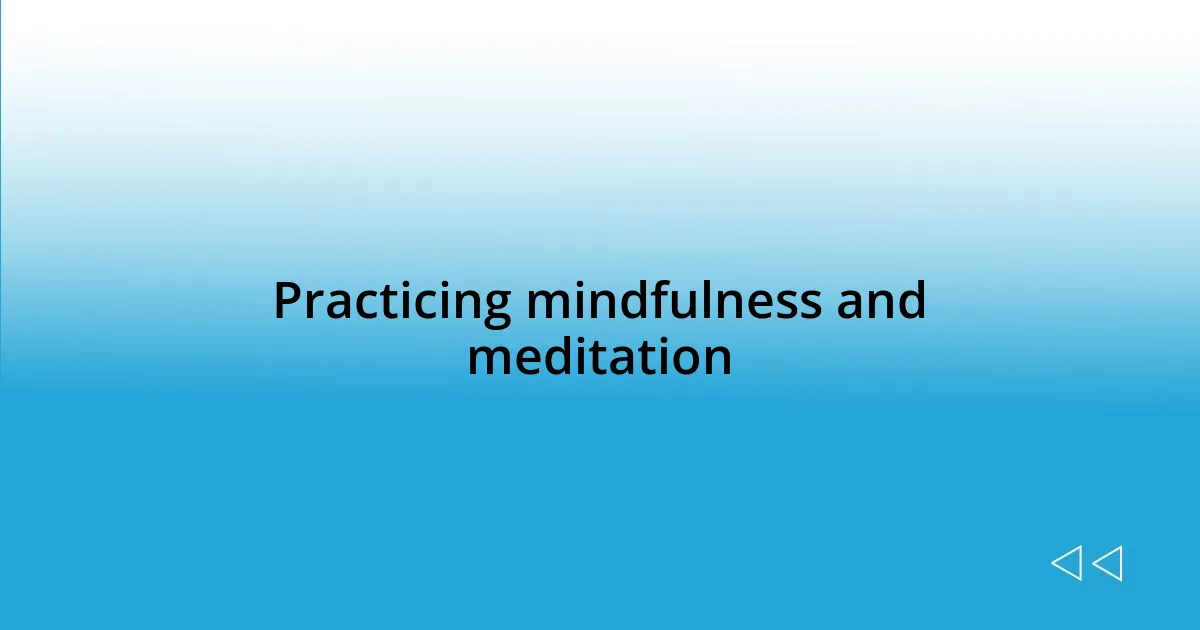
Practicing mindfulness and meditation
Practicing mindfulness and meditation has been a game changer for me during tough times. I remember sitting in a quiet corner, my mind buzzing with racing thoughts, and deciding to just breathe. Focusing solely on my breath felt like hitting a reset button; the chaos around me began to fade while I found a sense of stillness. Have you ever tried to observe your thoughts without judgment? It’s remarkable how liberating that can feel.
In my experience, incorporating short meditation sessions into my routine has helped me cultivate a sense of grounding. There are days when anxiety feels insurmountable, and in those moments, just five minutes of mindful breathing can shift my entire perspective. I often visualize those anxious thoughts as clouds drifting by—observing them without getting swept away has given me a newfound freedom. Isn’t it powerful how a simple practice can transform your mental landscape?
One particularly challenging week, I began practicing mindfulness through my morning coffee ritual. Instead of rushing, I allowed myself to savor each sip, fully immersed in the aroma and warmth. This small act became a cherished moment of peace amidst chaos, reminding me that mindfulness doesn’t always need to be formal or time-consuming. Have you found that integrating mindfulness into everyday activities can enhance your overall well-being?
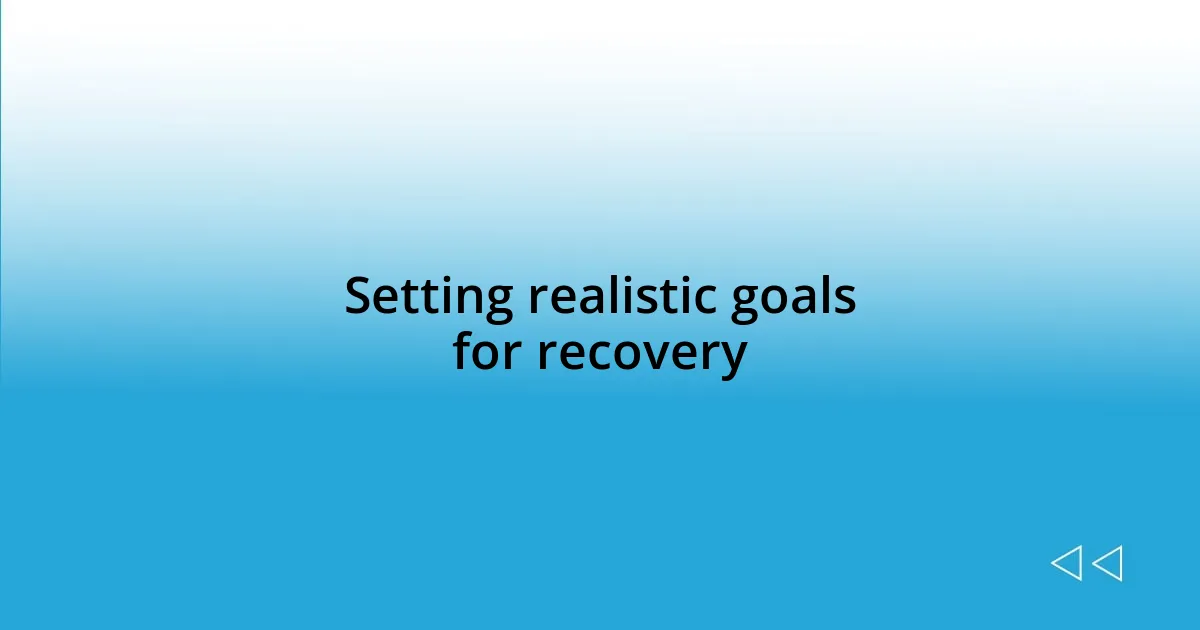
Setting realistic goals for recovery
Setting realistic goals for recovery has been a crucial part of my journey. I remember a time when I felt overwhelmed by the enormity of what I wanted to achieve. Breaking down my recovery into manageable, bite-sized goals helped me stay focused and motivated. Have you ever found that approaching a challenge step-by-step can make it less daunting?
Initially, I would aim for lofty milestones—like feeling completely ‘normal’ again overnight. But I soon learned that such expectations only led to frustration. Instead, I started celebrating small victories, like getting out of bed at a reasonable hour or taking a short walk outside. These tiny achievements reminded me that progress doesn’t always have to be grand; it can be subtle and still significant. Doesn’t it feel rewarding to acknowledge even the smallest steps forward?
Looking back, I realize that setting specific, achievable goals provided me with direction amidst the chaos. For example, rather than aiming to eliminate stress completely, I focused on managing it better through relaxation techniques. This shift in mindset allowed me to see challenges not as obstacles but as opportunities for growth. How do you frame your goals to ensure they empower rather than overwhelm you?
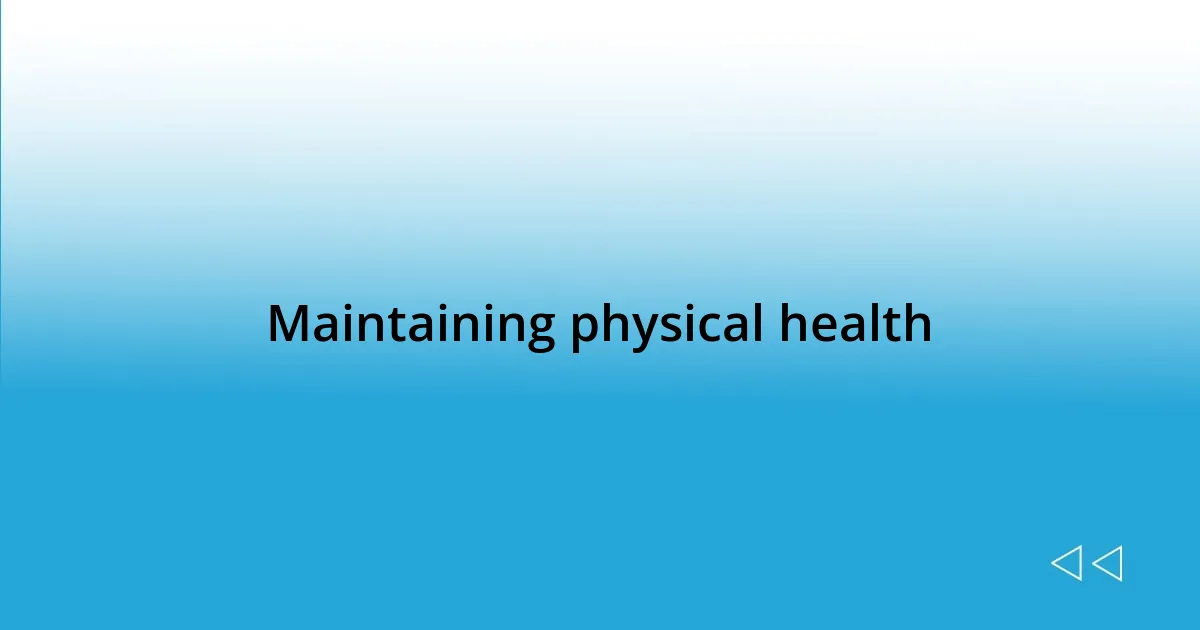
Maintaining physical health
Maintaining physical health has always been a priority for me, especially during turbulent times. I remember a particularly stressful period when I decided to recommit to regular exercise. Even something as simple as a daily walknot only helped me clear my mind but also released those feel-good endorphins. Have you ever noticed how a brisk walk can instantly lift your mood and energy levels?
In my experience, nutrition plays an equally significant role in how I navigate challenging moments. I recall once reaching for comfort food during a tough week, only to feel sluggish and regretful afterward. Since then, I’ve made it a practice to prepare nutrient-rich meals that fuel my body and mind. It’s astonishing how the right foods can elevate my spirits; haven’t you felt that boost when you nourish yourself with wholesome ingredients?
I have also found that regular sleep routines significantly impact my resilience during tough times. I used to underestimate the importance of a good night’s sleep until I started experiencing its effects firsthand. Now, I aim to wind down each evening with a calming ritual, like reading or gentle stretching, which prepares my mind and body for rest. How have your sleeping habits influenced your overall well-being? I’ve learned that prioritizing sleep isn’t just a luxury—it’s a vital component of maintaining my health and emotional balance.

Seeking professional help when needed
There have been moments in my life when navigating challenges felt impossible, and it’s during those times that I turned to professional help. I remember feeling lost and uncertain until I decided to reach out to a therapist. That decision was pivotal; having someone to talk to who could provide impartial support made a world of difference. Have you ever thought about how sharing your burdens can lighten the load?
Seeking professional help isn’t just an option; for me, it’s a vital step in self-care. I vividly recall the first time I walked into a counselor’s office, nerves buzzing in my stomach. It felt like stepping into a sanctuary where my struggles were acknowledged without judgment. That experience taught me that professionals can offer clarity and coping strategies, sometimes even seeing things I couldn’t recognize in myself. Have you ever considered that seeking help might actually be a sign of strength rather than weakness?
I’ve also found that therapy provides a safe space for reflection and growth. The exercises and techniques I learned helped me gain insight into my triggers and patterns. I’ll never forget one session where I discovered how my past experiences shaped my reactions to stress—suddenly, everything made sense. It was enlightening! When was the last time you reflected on how your experiences influence your current mindset? Ultimately, embracing professional guidance has been one of the most empowering choices I’ve made.











